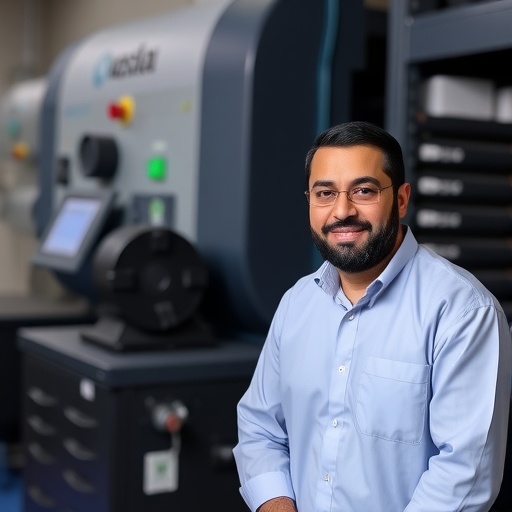On Wednesday, October 29 at 14:00 Beijing Time, the environmental engineering community will witness a highly anticipated virtual presentation by Professor Salah Jellali of Sultan Qaboos University, Oman. His groundbreaking research focuses on nutrient-enriched biochar, an innovative advancement poised to transform the landscape of sustainable agriculture and circular economy frameworks. This research advances conventional biochar applications by integrating nutrient-rich waste streams into the biochar production process, thereby enhancing its efficacy as a slow-release fertilizer while promoting resource recovery and environmental stewardship.
Biochar, primarily produced through pyrolysis—a thermal decomposition of biomass in low-oxygen conditions—has garnered extensive attention for its ability to improve soil health, sequester carbon, and support sustainable farming practices. However, traditional biochar often lacks essential macronutrients vital for plant growth, limiting its effectiveness as a standalone soil amendment. Professor Jellali’s work fundamentally addresses this gap by valorizing nutrient-rich wastewater and mineral waste streams. By infusing these nutrients into the biochar matrix during pyrolysis, the resulting product delivers targeted nutrient release, thereby elevating crop productivity and nutrient use efficiency.
The integration of industrial byproducts and agricultural residues in nutrient-enriched biochar production epitomizes the principles of circular economy, facilitating the closure of nutrient cycles that would otherwise result in environmental pollution. Innovative pyrolysis technologies enable controlled thermal conversion, ensuring that nutrient compounds are stabilized within the biochar structure, enhancing their availability and longevity once applied to soils. These stable nutrient stocks not only reduce dependency on synthetic fertilizers but also mitigate nutrient runoff, a major contributor to eutrophication in aquatic ecosystems.
Professor Jellali’s research elaborates on the physicochemical characterization of nutrient-enriched biochar, revealing improvements in cation exchange capacity, porosity, and surface functional groups compared to conventional biochar. These enhanced properties promote beneficial soil-microbe interactions, improved water retention, and gradual nutrient release, all critical parameters for sustainable soil management. Experimental evidence from his trials demonstrates significantly enhanced crop yield responses across diverse agronomic systems, underpinning the potential for widespread adoption.
Beyond its agronomic benefits, nutrient-enriched biochar contributes significantly to waste valorization by transforming problematic waste streams into value-added products. The premixing of nutrient-rich effluents or mineral waste prior to pyrolysis allows for the adsorption and chemical integration of nutrients on the biochar. This innovation presents a dual environmental solution: the reduction of waste disposal impacts and the provision of eco-friendly fertilizers, thus reinforcing the nexus among waste management, agriculture, and climate change mitigation.
The environmental implications of nutrient-enriched biochar extend to its role in carbon sequestration and greenhouse gas (GHG) mitigation. By sequestering carbon in a stable form within soils and reducing synthetic fertilizer inputs—which are associated with high GHG emissions during production—the overall carbon footprint of agricultural practices can be significantly lowered. Professor Jellali’s work underscores the climate-smart potential of biochar technology as a multifaceted approach for achieving soil health, food security, and environmental sustainability concurrently.
The ongoing research emphasizes not only scientific advancements but also practical deployment strategies. Technical optimization of pyrolysis parameters, such as temperature, residence time, and feedstock composition, enables tailoring biochar properties to specific soil and crop requirements. Scaling these technologies for on-farm or industrial application remains a key focus, integrating sensor-based monitoring and process automation to ensure consistent product quality and economic viability within agricultural supply chains.
In conjunction with his research, Professor Jellali is joined by Dr. Yu Luo, a Clarivate Highly Cited Researcher renowned for expertise in soil organic matter dynamics. Their collaboration epitomizes the fusion of cutting-edge scientific inquiry and real-world environmental innovation, providing a holistic perspective on the transformative potential of sustainable materials and waste-to-resource technologies in modern agriculture systems.
Participants of the live session can anticipate a detailed exploration of nutrient bioavailability mechanisms within enriched biochar, including discussions on nutrient speciation, mineral interactions, and long-term soil amendments impacts derived from controlled field studies. This event sets the stage for critical knowledge exchange among researchers, agricultural practitioners, policymakers, and sustainability advocates seeking scalable and impactful solutions to align agricultural productivity with environmental conservation.
The session also serves as a platform to discuss policy frameworks that support circular economy initiatives and incentivize the adoption of advanced biochar technologies. Emerging regulations on waste management, nutrient runoff control, and agricultural sustainability directly intersect with the innovations presented, positioning nutrient-enriched biochar as a strategic component in global efforts toward resilient food systems and environmental protection.
For those who wish to join this landmark talk, scanning the provided QR code will facilitate registration, delivering essential virtual access information including Zoom links and passwords. The event’s timing is staggered to accommodate global audiences across multiple time zones, ensuring international participation and discourse.
As sustainable agriculture faces mounting challenges from climate change, soil degradation, and resource constraints, the innovations spearheaded by Professor Salah Jellali highlight a promising path forward. Nutrient-enriched biochar stands as a testament to the power of interdisciplinary research and technology integration in fostering a circular, regenerative economy that benefits both people and the planet.
This upcoming lecture not only celebrates technical excellence in biochar research but also catalyzes momentum toward practical deployments that bridge science to field-level impact. It marks a pivotal moment in environmental engineering, signaling innovative shifts toward leveraging waste as a resource to achieve agricultural sustainability and food security on a global scale.
Subject of Research: Nutrient-enriched biochar for sustainable agriculture and circular economy
Article Title: Innovative Biochar Research to Boost Circular Economy: Join Live Talk by Prof. Salah Jellali on October 29
News Publication Date: October 29, 2024
Image Credits: Salah Jellali, Yu Luo
Keywords: Fertilizers, Soil science, Environmental sciences, Food security, Sustainable agriculture, Sustainability




